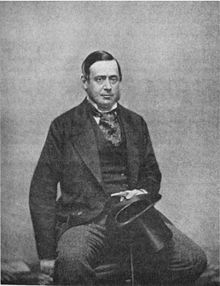
Back Richard Lyons Czech Richard Lyons, 1. Viscount Lyons German Richard Lyons (diplomate) French Richard Lyons, 1:e viscount Lyons Swedish
Richard Bickerton Pemell Lyons, 1st Earl Lyons GCB, GCMG, PC (26 April 1817 – 5 December 1887) was a British diplomat, who was the favourite diplomat of Queen Victoria, during the four great crises of the second half of the 19th century: Italian unification, the American Civil War, the Eastern Question, and the replacement of France by Germany as the dominant Continental power following the 1870 Franco-Prussian War. Lyons resolved the Trent Affair during the American Civil War; and contributed to the Special Relationship and to the Entente Cordiale; and for predicting, 32 years before World War I, the occurrence of an imperial war between France and Germany that was to destroy Britain's international dominance.
Lyons served as British Ambassador to the United States from 1858 to 1865, during the American Civil War; and as British Ambassador to the Ottoman Empire from 1865 to 1867; and as British Ambassador to France from 1867 to 1887, which was then the most prestigious office in the British Service. Lyons was offered the office of British Foreign Secretary on three separate occasions, by three separate Prime Ministers (Gladstone, Disraeli, and Salisbury), and was encouraged to accept that office by Queen Victoria, but he declined the offer on all three occasions. Lyons endorsed the British Conservative Party faction of the 3rd Marquess of Salisbury, and was distrusted by Gladstonian Liberals as a 'Tory-leaning diplomat'.
Lyons's most recent biographer Jenkins (2014) considers Lyons to be the exemplar of the ‘Foreign Office mind’ who created a canon of practical norms of diplomacy, including the necessity for nominal neutrality in domestic party politics and for private correspondence with Cabinet ministers. Lyons founded the 'Lyons School' of British diplomacy: which consisted of Sir Edwin Egerton; Sir Maurice de Bunsen; Sir Michael Herbert; Sir Edward Baldwin Malet; Sir Frank Lascelles; Sir Gerard Lowther; Sir Edmund Monson, 1st Baronet; and Sir Nicholas O'Conor.
